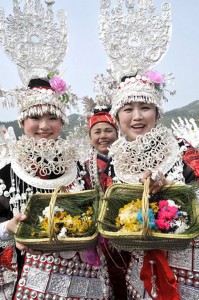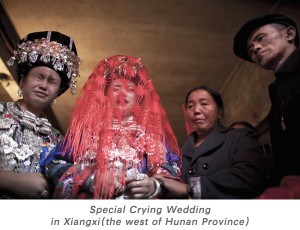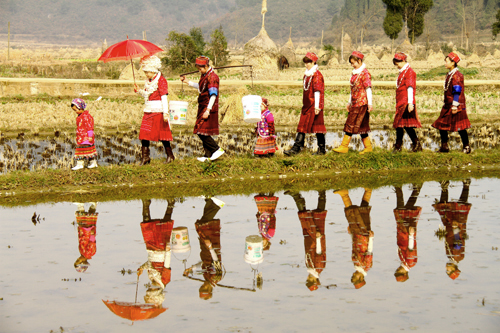On top of social bonding, Miao customs become particularly complex and significant during courtship. Nowadays Miao men and women are free to mingle and premarital sex is tolerated within the community. Men and women can select their own husbands and wives, although certain customs are still adhered to. During the Miao New Year, groups of girls and boys from different villages will pass a ball to one another as part of the festivities. This act is designed to introduce them to one another from an early age and help deepen their affections for one another.
By the time they are older, they will take part in a courtship ritual that is made up of two main stages. The first stage, known as the “walking around” stage or sometimes the “visiting villages”, “meeting girls” or “stepping the moon” stage, is when men from surrounding villages will travel to one village to meet the women. This usually takes place during major festivals and will be held on a designated site near the village. The second stage takes place directly after the first and it is when the men sing antiphonal love songs to the women.
 Although they are not as well-known for their singing as the Dong ethnic minority, the Miao people are very fond of singing and dancing. Their songs do not rhyme, are easy to understand and can vary in length from a few lines to more than 15,000. Through this antiphonal singing, women and men can get to know each other’s backgrounds better. Once a man likes and a woman and it is established that she returns his affections, they will secrete themselves from the designated site and sing or talk privately. After they have gotten to know each other over a period of time, they will exchange love tokens called “diubabin” and decide to get married. When a man and woman fall in love, people in the village will all prepare and eat glutinous rice cakes. These glutinous rice cakes are also given out during the Sister’s Meal Festival, a Miao festival similar to that of Valentine’s Day, and are regularly exchanged between boys and girls as a token of affection.
Although they are not as well-known for their singing as the Dong ethnic minority, the Miao people are very fond of singing and dancing. Their songs do not rhyme, are easy to understand and can vary in length from a few lines to more than 15,000. Through this antiphonal singing, women and men can get to know each other’s backgrounds better. Once a man likes and a woman and it is established that she returns his affections, they will secrete themselves from the designated site and sing or talk privately. After they have gotten to know each other over a period of time, they will exchange love tokens called “diubabin” and decide to get married. When a man and woman fall in love, people in the village will all prepare and eat glutinous rice cakes. These glutinous rice cakes are also given out during the Sister’s Meal Festival, a Miao festival similar to that of Valentine’s Day, and are regularly exchanged between boys and girls as a token of affection.
 During weddings, special glutinous rice cakes with patterns of a dragon and a phoenix will be eaten and established couples will drink from what is called the “nuptial cup”. This is where partners pour the liquor into each other’s mouth or link arms and then drink from their own cup. Toasts like these are usually proposed by women. Normally the first toast is made to the host, followed by toasts to the guests. In some cases, the first toast is made to the eldest person attending the feast. Traditionally two cups of horn spirit must be drunk as part of a toast. The Miao believe this is a fitting number, as people walk with two feet so they can drink two cups of horn spirit.
During weddings, special glutinous rice cakes with patterns of a dragon and a phoenix will be eaten and established couples will drink from what is called the “nuptial cup”. This is where partners pour the liquor into each other’s mouth or link arms and then drink from their own cup. Toasts like these are usually proposed by women. Normally the first toast is made to the host, followed by toasts to the guests. In some cases, the first toast is made to the eldest person attending the feast. Traditionally two cups of horn spirit must be drunk as part of a toast. The Miao believe this is a fitting number, as people walk with two feet so they can drink two cups of horn spirit.
Join a travel with us to discover the Culture of Miao Ethnic Minority: Explore the culture of Ethnic minorities in Southeast Guizhou
